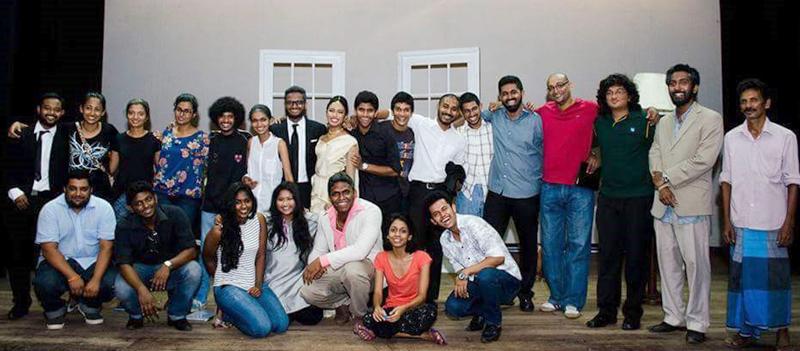
A feature series of Q&A interviews with Sri Lankan theatre practitioners on perceptions and perspectives of what lie ahead for Sri Lankan theatre as the world grapples with a pandemic that calls for ‘social distancing’.
 In this week’s instalment of The State and Fate of Theatre, I present to the readers of the Sunday Observer, a playwright, director and actor of the English stage from the hill capital, Kandy. The founder and lead creative director of Sri Theatre Company, Aslam Marikar is an ardent proponent and of original theatre and has staged his original English medium plays in Kandy, Colombo and also Galle.
In this week’s instalment of The State and Fate of Theatre, I present to the readers of the Sunday Observer, a playwright, director and actor of the English stage from the hill capital, Kandy. The founder and lead creative director of Sri Theatre Company, Aslam Marikar is an ardent proponent and of original theatre and has staged his original English medium plays in Kandy, Colombo and also Galle.
 An old boy of Trinity College Kandy, Aslam’s involvement in school theatre saw his alma mater clinch the much coveted Winner’s Trophy at the All Island Interschool Shakespeare Competition in the boys’ category, last year under his directing talents. A practitioner in theatre who has committed himself fully to his craft, Aslam shares his views and concerns about the present situation of theatre in Sri Lanka and what may loom in days ahead.
An old boy of Trinity College Kandy, Aslam’s involvement in school theatre saw his alma mater clinch the much coveted Winner’s Trophy at the All Island Interschool Shakespeare Competition in the boys’ category, last year under his directing talents. A practitioner in theatre who has committed himself fully to his craft, Aslam shares his views and concerns about the present situation of theatre in Sri Lanka and what may loom in days ahead.
Q. Did the nationwide lockdown and the subsequent situation that arose, halt any theatre productions that you had planned for this year?
A: Yes it did. We were planning to restage Anarchy with a new cast and director. We made a few initial payments and also made public the play through a press release. The Sunday Observer published a poster as well the day the lockdown was officially initiated.
Q. Looking at the next two years, how will the pandemic situation affect your plans as a theatre practitioner engaged in aspects of theatre such as writing, directing and producing stage plays?
A. As a writer it only gives you more content to think about as every moment in history has somewhere within a story worth telling. As a director and producer, you are dependent on the economics of your community. This is not to say that writers are free from financial restrains. The very sound of your growling stomach will prove me wrong.
However, a writer’s creative process is a lot more accessible because it requires paper and pen or a laptop.
 The next two years will be a lot more challenging than before. We have been given the green light by the Government to stage dramas under specific conditions. We have already begun with planning to stage Anarchy. We hope matters work according to plan.
The next two years will be a lot more challenging than before. We have been given the green light by the Government to stage dramas under specific conditions. We have already begun with planning to stage Anarchy. We hope matters work according to plan.
Q. As a practitioner your chosen avenue in theatre is to write, direct and produce original stage plays in English. English theatre in Sri Lanka is by and large Colombo centric, and you are from Kandy. However over the years you have seen a demand for your productions in your home town of Kandy as well as in cities such as Galle on occasions, and thereby created the presence of English theatre in Sri Lanka outside the realm of Colombo. In your experience how do you see the state of English theatre to grow outside of Colombo in the coming years given the pandemic context which may call for further lockdowns? What changes do you see for English theatre in Sri Lanka to grow outside the ‘big city’ given the ‘Covid vagaries’ that may assail the performing arts?
A. First of all, I must say that it is very easy to be original. At any given moment in space time your place in the universe is unique, describe what you see around you in your own words and then you have something original. I don’t see much changes happening to the English Theatre scene outside the big city as there were only a very few of us actually at it. Due to more people forced to stay within city limits we might be able to have more practice sessions and that could result in more productions being staged. The latter statement one could align with wishful thinking.
Q. Thinking in terms of adapting to times and devising strategies, do you see yourself working ‘outside the proscenium’ exploring new avenues to bring your creativity in theatre through new ‘spaces’ and media?
A. Definitely. We must change and adapt to these new times. Freedom of expression must not be stifled. However, theatre is a collective art form perceived live by an audience. Whatever is done must satisfy this requirement for it to be theatre. I strongly believe that a pay per view television channel can come in handy. Street theatre is also an option that can be considered.
